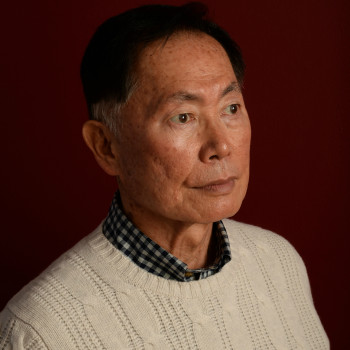The new documentary “To Be Takei” tells the personal story of actor, activist, and pop-culture juggernaut George Takei. The film follows him from a childhood in a World War Two-era U.S. internment camp, to the stars (or “Star Trek,” anyway), and beyond: breaking ground as a leader for the Asian-American and LGBT communities. He tells Brendan how he managed to get bitten by the acting bug despite his prison-camp youth… and how to finish a marathon.
Brendan Francis Newnam: I was wondering, what surprises people about your story? Or even, what surprises you about the questions they ask about your story?
George Takei: Well, first of all, what surprises me is that so many people who seem otherwise well-informed are surprised. They didn’t know that something like the imprisonment of American citizens — innocent American citizens, who had nothing to do with Pearl Harbor but happened to look like the people who bombed Pearl Harbor — were summarily rounded up in the most unconstitutional way, and put into these barbed-wire prison camps. And for me, as a child… you know, children are amazingly adaptable. What would be grotesquely abnormal became my normality.
Brendan Francis Newnam: About being a child, you bring up in the documentary the word – correct me if I’m pronouncing it wrong – gaman, which means ‘to endure with dignity.’ And it describes your parents’s strategy about how they dealt with this kind of humiliating experience. It’s difficult to reconcile that with the George we meet as a child, who is a bit of a ham, who knew he was going to be an actor from the beginning. And I’m wondering how did your budding showmanship fit into this bleak space?
George Takei: Occasionally, the camp command would allow, after dinner in the mess hall, to have the tables all cleared out, and they would hang a bed sheet at one end of the mess hall, and run old Hollywood movies. That was magical. There was another world outside of the barbed wire fences. I remember Joan Crawford, oh how she suffered! Or I remember seeing “The Hunchback of Notre Dame.” So I was able to vicariously escape the barbed wire fences.
Brendan Francis Newnam: You were also seeing the actors and thinking, “This is a path that I may want to take.”
George Takei: Well, they also showed old Japanese movies, samurai movies, that were imported before the war. But they had lost the soundtracks for many of them. They were, you know, rip-snortin’ good samurai movies with a lot of swordplay. But, because of the missing soundtrack, there was a man that traveled with that film from block to block when it was shown, and he played all the parts. He had the roles all memorized, I guess. And he was… you know, the shogun: “[speaks deep, authoritative-voiced Japanese]!” Or the peasants: “[hushed, urgent Japanese voices]!” And the princess would say: “[whinier, drawn Japanese]!”
You know, I was just amazed by that. It was amazing. And that also opened up my mind about all the performing potential and how magical it can be.
Brendan Francis Newnam: When you returned to Los Angeles, you joined the drama club in your high school, Los Angeles High School. And you went on and you had a career. And you are continuing to have a career in acting. And I’m going to make a confession: I’m not a Trekkie. I have nothing against Trekkies…
George Takei: You are not a Trekkie? There is a void in your life. You have lived a disadvantaged youth!
Brendan Francis Newnam: Well, I’ve stayed in reality. And, you’re right, it cuts both ways. But, maybe you can help me. As a non-Trekkie, can you tell me what makes a Trekkie? What do people love about “Star Trek?” Because you continue to go to conventions and it’s a big part of your life.
George Takei: “Star Trek” was a show that had a philosophy and a vision for the future. It used metaphors to deal with contemporary issues. The Starship Enterprise was the biggest metaphor of the show, it was a metaphor for ‘starship’ Earth. And the philosophy was that the diversity of this planet, coming together, working in concert, is what makes it possible for us to face the challenges and overcome and face newer challenges.
But also, sci-fi geeks and nerds are people who feel like they are outsiders, and they all connected with this common ground.
Brendan Francis Newnam: Now you’re making me feel bad for not being a Trekkie.
George Takei: Yes! Of all people! People like you!
Brendan Francis Newnam: ‘Cause I care about the world, I believe in that. I just liked “The Dukes of Hazard,” What can I say?!! I liked “M*A*S*H.”!
George Takei: Well, we dealt with [war] too, metaphorically. Maybe you’re not a metaphorical person.
Brendan Francis Newnam: I’m just not a pajama person!
So, you have overcome huge challenges in your life. Internment, prejudice against gays, stereotypes, Trekkies harassing you…
George Takei: Oh, no. They don’t harass me. Bless their hearts, I love them.
Brendan Francis Newnam: Yet you are famous for your equanimity. How do you maintain that?
George Takei: I think this way of looking at life: saying that, you know, if you’re positive, you can change people. But if you’re negative, it’s going to change you. If you say “I can’t run a marathon,” you can’t. But if you have that will and that determination, you will be able to do it. And when you start training there are times when you say, “Oh, no, my muscles are killing me.”
Brendan Francis Newnam: “Let’s go get a cheeseburger.”
George Takei: Well, that’s carbo-loading! And protein! So that’s good when you’re doing a marathon! But you say to that muscle that’s killing you, “Muscle, behave! You are going to do it! I am determined to do this marathon. Finish it!”
And you will.


